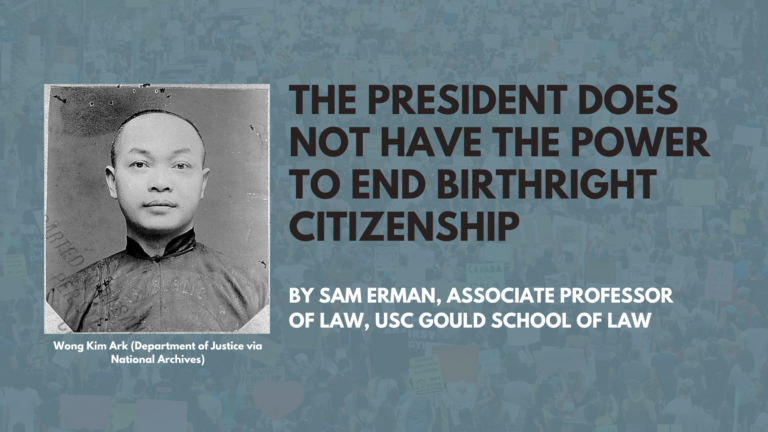
The President Does Not Have the Power to End Birthright Citizenship
Earlier this week, President Donald Trump declared that either he or the Congress could end birthright citizenship in the United States: “You can definitely do it with an Act of Congress. But now they’re saying I can do it just with an executive order.” Not likely.
To start, there is zero chance that the courts will permit Trump to end birthright citizenship through an executive order. The Constitution expressly vests the naturalization power in Congress, not the President. And the Supreme Court has found that it is Congress, not the president, whom the Constitution empowers to regulate immigration. On the question of birthright citizenship, Congress has not delegated the question to the president, but rather set the rule itself. As Republican Speaker of the House Paul Ryan put it: “You cannot end birthright citizenship with an executive order.”
Even if Congress wanted to go along with Trump, the Fourteenth Amendment to the Constitution stands in the way. It guarantees U.S. citizenship to anyone “born…in the United States, and subject to the jurisdiction thereof.” It is long settled that the first requirement – birth on U.S. soil – is met by birth in any U.S. state or the nation’s capital. The second requirement is birth subject to U.S. jurisdiction. In the 1890s, there was an attempt to convince the Supreme Court that the American-born children of Chinese nationals were not subject to U.S. jurisdiction. In the 1898 Wong Kim Ark decision, the U.S. Supreme Court flatly rejected that view. It held that birth in the United States to alien parents meant that children were born subject to U.S. jurisdiction and thus U.S. citizens. To be born on U.S.-governed U.S. land yet outside U.S. jurisdiction, one had to be either the child of a foreign consular official or the child of an American Indian whose primary allegiance ran to a U.S. tribal nation.
The Supreme Court should be loathe to reverse Wong Kim Ark. The decision has proved to be a particularly clear, strong, and enduring precedent. The view it takes tracks those expressed by both the advocates and the opponents of the Fourteenth Amendment at the time of its drafting. It is also the most natural reading of the text and the approach that the political branches have consistently taken to the question. When text, original intent, original public meaning, precedent, and historical practice all point in the same direction, the justices are usually loathe to disagree.
Of course, Trump could try to change the Fourteenth Amendment. But the Founders intentionally made that difficult. It takes a super majority that does not now exist and will not come to exist absent a massive shift in public opinion.
About the author
Sam Erman (serman@law.usc.edu) is Associate Professor of Law at USC Gould School of Law. He is an expert in constitutional law, legal history, the Fourteenth Amendment, and the Supreme Court.